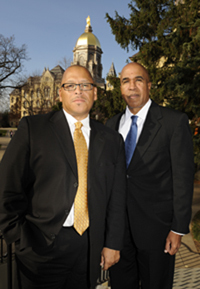
A new, unprecedented national survey of African American Catholics by University of Notre Dame researchers reveals several significant insights into individual religious engagement and identifies several notable demographic trends facing the church.
The survey was sponsored by the National Black Catholic Congress and Notre Dame’s Institute for Church Life and Office of the President.
Notre Dame social scientists Darren W. Davis and Donald B. Pope-Davis, who co-authored the report, set out to test the validity of anecdotal accounts that African American Catholics were becoming increasingly disengaged from their religion. Although the primary focus of the survey is on African American Catholics, the researchers utilized a significant comparative component with white Catholics, which resulted in several notable findings about both groups of Catholics.
The survey also is historic in that it represents the largest sample of African American Catholics ever surveyed on their faith.
Among the key findings of the survey are:
• On almost every measure of religious engagement, African American Catholics are considered stronger in their faith than white Catholics. For example, when asked how well their parish meets their spiritual needs, 78 percent of African American Catholics say their needs are being met, while 68.7 percent of white Catholics responded similarly. When asked if their parish meets their emotional needs, 75.7 percent of African American Catholics say their needs are being met, compared to 60.4 percent of white Catholics.
• One major difference in the religious engagement between African American Catholics and white Catholics is the importance each group attaches to social networks in the parish. On a question that asked about how important it was that friends attended their church, 28.9 percent of African Americans considered it important, while only eight percent of white Catholics considered it important.
“This finding also shows up among African American Catholics who attend predominantly black parishes,” Davis said. “A greater sense of community that comes from worshipping with others who share cultural heritage heightens religious engagement.
“Whatever forces are working against white Catholics’ religious identity and engagement were set in motion decades ago and those forces do not appear to be working against African American Catholics.
“Thus, it is quite possible that understanding African American Catholicity may inform us about the religious challenges of white Catholics. Too often we approach questions of religiosity in a vacuum. Comparable studies of religiosity are critical.”
Two key survey findings of the quality of religious service and religious engagement were:
• On the often-used measure of Church attendance, 48.2 percent of African-Americans attend church at least once per week, compared to only 30.4 percent of white Catholics.
• While there is generally high satisfaction with various aspects of Mass and church service, such as preaching, music, readings and prayers, Catholics’ (both white and African Americans) level of satisfaction with these aspects of Mass are noticeably lower than Protestants.
“This finding is interesting because we often hear anecdotal complaints about the Catholic Mass as quiescent, but most Catholics do not share this view,” Pope-Davis said. “But, relative to the components of Protestant church service, Catholics are not as satisfied.”
Despite their high level of religious engagement, African American Catholics are not completely satisfied with the scope of racial inclusiveness in the Church:
• About one in four African American Catholics perceive racism in their parish. A total of 31.5 percent say they are uncomfortable because they are the only person of color in their parish, 25.9 percent say that fellow parishioners avoid them because of their race, 23.6 percent say that fellow parishioners reluctantly shake their hands and 24.9 percent say they have experienced racial insensitivity toward African Americans from their priest.
• African American Catholics see room for growth in the racial positions of the Catholic Church. A total of 36.6 percent are satisfied with the targeting of black vocations, 38.1 percent are satisfied with the Church’s emphasis on black saints, 39.9 percent are satisfied with promoting black bishops, 40.2 percent are satisfied with the Church’s support for issues like affirmative action, 44.2 percent are satisfied with the Church’s position on problems in Africa, and 45.1 percent are satisfied with the promotion of racial integration in the Church.
• At the same time, however, 22.9 percent of African Americans consider the Catholic Church racist against African Americans.
“Asking questions about abstract racism in the Church breaks down somewhat when asked about specific elements of the Church,” Davis points out. “This is not that unusual in survey research. But, it is clear that while there are still challenges for many African American Catholics in their parishes, the views of the institutional Church are more jaundiced or jaded.”
The survey also uncovered notable national demographic trends that are evident within religious denominations that have great consequences for the future Church.
• A total of 52.6 percent of African American Catholics and 53.3 percent of African American Protestants are at least 45 years-old, compared to 63.2 percent of white Catholics and 62 percent of white Protestants.
• There are also huge racial differences in the percentage that are married, reflecting another national trend. A total of 39.9 percent of African American Catholics and 34.8 percent of African American Protestants are married, compared to 53.9 percent of white Catholics and 13.9 percent of white Protestants.
• A larger percentage of African American Catholics have college degrees than African American Protestants. But overall, a larger percentage of Catholics are college-educated.
“It is clear that moving forward, Church leaders should pay closer attention to the demographic shifts in society and understand that because of race, a multifaceted approach would probably work best,” Pope-Davis notes. “The forces that shape white Catholicity are different from the forces that shape African American Catholicity.”
Contacts: Darren Davis, 574-631-1030, darren.davis@nd.edu; Don Pope-Davis, 574-631-5716, dpd@nd.edu